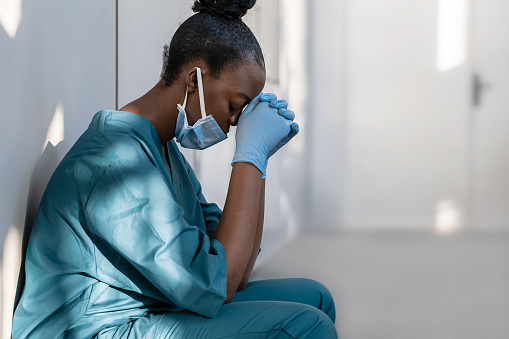Hospital Workers Face Higher Risk of Injuries & Illnesses

An experienced workers’ comp lawyer explains
Nurses, doctors, surgeons, occupational therapists, medical technicians, and other healthcare professionals working in hospitals face a significantly higher risk of sustaining an injury or illness on the job compared to other professions, according to the Occupational Safety and Health Administration (OSHA), the federal agency responsible for enforcing workplace safety and health standards nationwide.
According to the most recent OSHA workplace injury and illness statistics, hospitals nationwide reported 221,400 work-related injuries and illnesses in 2019. Such work-related illnesses and injuries amounted to 5.5 incidents for every 100 full-time hospital employees. That incident rate is almost twice as much as the injury and illness rate for all private industries nationwide, making hospitals “one of the most hazardous places to work,” according to OSHA.
Many work-related injuries and illnesses are eligible for workers’ compensation benefits. However, obtaining these benefits can often be challenging. This is why it’s important for sick or injured hospital professionals to better understand the issue and their legal rights.
Common hospital worker injuries
Injuries sustained in hospitals by employees working there can cover a wide range. Common injuries among nursing aides, orderlies, medical assistants, paramedics, and other hospital professionals include:
- Broken bones due to slip and fall accidents, being crushed by an object, falling from a height or blunt force trauma.
- Musculoskeletal disorders (MSD) due to hazardous or dangerous working conditions. MSDs often involve injuries to the muscles, nerves, joints or tendons due to repetitive work involving muscle strains and sprains, as well as carpal tunnel syndrome. This is why an MSD is often referred to as a repetitive motion injury, overuse injury, or repetitive stress injury.
- Back injuries, especially lower back injuries, due to overuse or as a result of a single incident. Such injuries can range from chronic lower back pain to a herniated disc, which is also known as a bulging disc.
- Head injuries, including concussions and other traumatic brain injuries (TBIs). These injuries are often sustained in slip and fall accidents or due to physical assaults by patients, co-workers, or the general public.
- Strained or sprained muscles, either due to overuse over time or a single, direct blow to the muscle. Either way, hospital workers and other healthcare professionals face a high risk of sustaining such injuries.
- Cuts and lacerations, including deep skin cuts to subcutaneous tissue, the innermost layer of skin. These types of cuts often require stitches, staples, or sometimes even surgery.
These are just some of the injuries hospital professionals regularly sustain on the job. There are many other types of injuries that can be just as serious and which require immediate medical attention.
Common hospital worker illnesses
Unlike many other professions, hospital workers face a high risk of contracting an illness on the job. Common illnesses sustained by hospital professionals include:
- Healthcare-acquired infection (HAI), which is an infection acquired in a hospital or another healthcare setting, including an acute care hospital, skilled nursing care facility or emergency room. Infections include pneumonia, gastrointestinal illness, urinary tract infections and Methicillin-resistant Staphylococcus aureus (MRSA), otherwise known as a staph infection.
- Sepsis, which is an illness in response to a severe infection. If not treated immediately, sepsis can be life-threatening.
- Airborne diseases such as measles, influenza (flu), and whooping cough (Pertussis). Hospital workers often contract such diseases due to coming into close contact with infected patients.
- Viruses such as the coronavirus, which can cause diseases such as COVID-19, due to exposure to patients and other people in the hospital with such diseases.
These are just some of the illnesses hospital professionals face every day on the job. This is why it’s important that hospitals take precautions to prevent worker illnesses or injuries.
Keeping hospitals safe and clean
There are many preventative steps hospitals can take in an effort to prevent workers from sustaining a serious injury or illness on the job, including:
- Maintaining sanitary conditions in the hospital.
- Hospitals providing workers with safety equipment and proper safety training.
- Providing employees with ergonomic equipment designed to prevent repetitive stress injuries.
- Providing workers with break times during their shift, especially if the job is physically demanding.
- Hiring security personnel to protect hospital workers from harm.
These are just some of the steps hospitals can and should take to protect workers’ health and safety. Unfortunately, some hospitals do not take all of these preventative measures, resulting in a serious workplace injury or illness. When that happens, it’s important that hospital workers understand their legal rights.
A workers’ comp attorney can help
If you sustain an injury or illness while working in a hospital, you may be eligible to receive workers’ compensation benefits and other benefits designed to help with your medical care and recovery. Unfortunately, obtaining workers’ comp benefits can sometimes be very difficult. This is why it’s important to talk with an attorney right away if you get hurt or sick while working in a hospital.
At the Law Offices of Deborah G. Kohl, we have years of experience helping hospital workers and other employees throughout Massachusetts and Rhode Island. As a result, we’re familiar with the state and federal rules and regulations that apply to healthcare workers and workplace safety. As your attorney, we can thoroughly investigate your claim and serve as a strong legal advocate, every step of the way.
Learn more about how we can help you and contact us today to schedule a free case evaluation with an experienced workers’ compensation lawyer. We have three office locations in Rhode Island and Massachusetts and handle workplace injury claims in both states.
